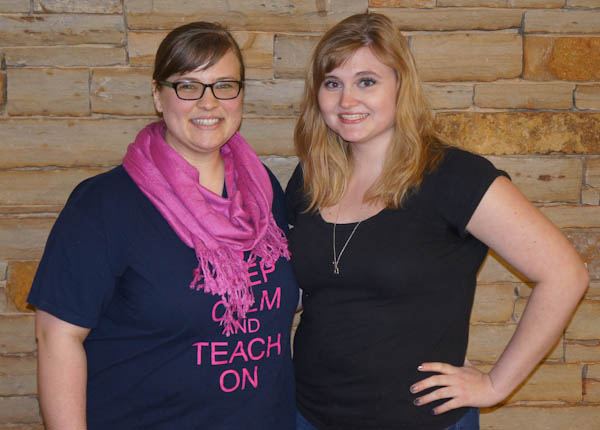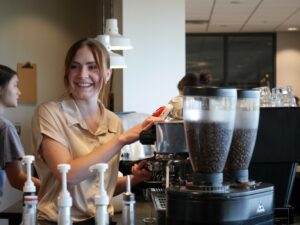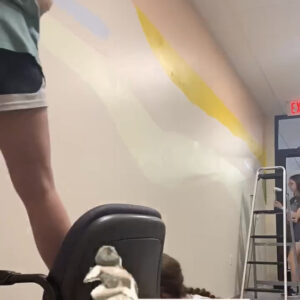Photo by: Henoc Kivuye
Oklahoma Christian University students volunteer their time to reach out to those who seek to learn English.
“[The program] always serves the same goal, but it’s done it in a variety of different ways,” senior Amanda Arnold said.
Associate Professor of English Gail Nash heads the Community Literacy Program.
“We recruit volunteer teachers from either on campus or in the community and connect them with ESL [English as a Second Language] students; adult learners who want to learn their English,” Nash said.
Sophomore Amber Flowers explained how difficult it can be for parents who don’t speak English to communicate with their children being raised in an English-speaking society.
“My mom works for the school system, and she works primarily with some of the counselors and the psychologists,” Flowers said. “They have students whose parents don’t speak English come in. … [It’s difficult] for these parents to just try to understand because they’re trying to find out what’s best for their children but they can’t.”
Oklahoma Christian’s literacy program has spread into the community, helping more parents improve their English.
“Word has gotten out that if you need ESL help and you’re not going to go to a school – you know if you can go to school, that’s one thing,” Nash said. “If for whatever reason you can’t, then word has gotten out in the literacy community to contact us.”
Not only are students from Oklahoma Christian volunteering to branch out and teach English in the community, some parents from outside of the college campus volunteer in the program as well.
“We have a couple of adult parent volunteers,” Nash said. “One goes out to a school, Oakdale, and teaches the parents of her children’s classmates. She’s sent a letter out, with the school’s permission, and offered some ESL classes to anybody in the school who wanted it because she knew that her kids had classmates who had parents who didn’t speak English that well.”
The literacy program found several ways to serve the community, but it also strives to improve things on campus as well.
“Before we had this program, the maintenance people on campus were kind of invisible,” Nash said. “… They were just kind of there because they didn’t speak English. There’s a tendency in that case to kind of keep your head down; you don’t make eye contact and you don’t make verbal contact because the languages aren’t the same.”
As the maintenance workers began learning English, Nash saw a shift in their exchanges with the Oklahoma Christian students.
“After we started teaching them English … there was more likelihood that they would make eye contact,” Nash said. “If someone on our campus said something like hi, [the maintenance workers] would try to answer back. There was an element that they became less invisible, and over the years more likely to be seen and heard by the students and faculty on campus.”
The members of the literacy program attempt to teach as many people as possible.
“It flexes with the students’ needs and with their wants and how their lives are going,” Arnold said. “It’s a really cool thing to say about a program because a lot of programs are pretty frigid and inflexible.”
This literacy program has the ability to make an impact on both the community surrounding Oklahoma Christian and the volunteers who give their time.
“There will be a lot of OC students that have been affected by the program as a result of volunteering in the program,” Nash said. “I’ve heard things like they graduate, then they go on, they become grown-ups in a community, and sometimes I get an email five years after graduation that’s like, ‘Thank you for that because now I’m helping in my community and my church and I know what to do.’”
While current volunteers prepare for lessons with their students and new volunteers anticipate the learning experience this will bring them, they both remember the purpose of their work and strive to do the best that they can, according to senior Hannah Massman.
“I think it’s just a great opportunity to give back to the people that serve us day in day out,” Massman said. “They’re here even when it’s snowing on the ground. [Teaching them isn’t] something that we can really give them, but it’s like a little token of thank you for everything that you’ve done for the past however many years.”















Be First to Comment